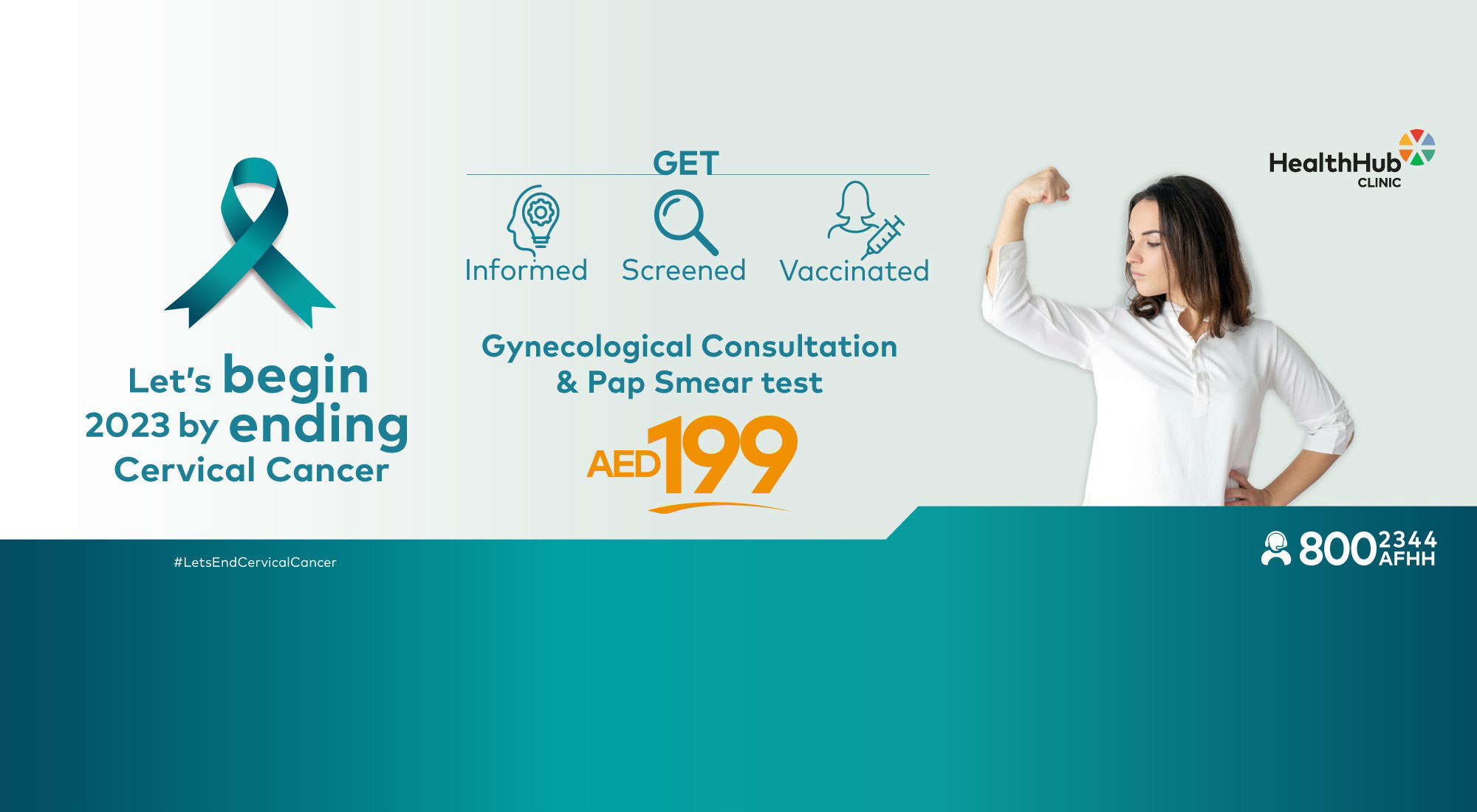
Cervical Health Awareness Month
Cervical cancer is a disease where the cells of the cervix start multiplying uncontrollably and 99% of the time is cause by the Human Papilloma Virus (HPV). It is the most common cancer in women and the fourth most fatal.
Without urgent action deaths are projected to rise by 25% over the next 10 years. HealthHub Clinics will be implementing a HPV screening programme in Dubai to reduce the incidence of cervical cancer and its mortality rates. The screening programme is in response to research that suggests that, currently, 30% of cervical cancer cases in the UAE are made up by Emirati women.
What is Cervical Cancer?
Cervical cancer develops when cells in the cervix begin to grow out of control and can then invade nearby tissues or spread throughout the body.
Cervical cancer usually develops very slowly. It starts as a precancerous condition called dysplasia. This precancerous condition can be detected by a Pap smear and is 100% treatable. It can take years for precancerous changes to turn into cervical cancer. Most women who are diagnosed with cervical cancer today have not had regular Pap smears or they have not followed up on abnormal Pap smear results.
Almost all cervical cancers are caused by HPV (human papilloma virus). HPV is a common virus that is spread through sexual intercourse. There are many different types of HPV. Some strains lead to cervical cancer. (Other strains may cause genital warts, while others do not cause any problems at all.)
A woman’s sexual habits and patterns can increase her risk for cervical cancer. Risky sexual practices include having sex at an early age, or partners who participate in high-risk sexual activities.
Figures
Worldwide, cervical cancer is the second most common cancer in women and the third leading cause of deaths.
In 2008, 530,000 new cases were diagnosed and 275,000 deaths resulted. Without urgent action, deaths are projected to rise by 25% over the next 10 years
Cervical cancer is the 2nd leading cancer and 7th cause of deaths for females in UAE. Most of the cases of cervical cancer in UAE are not detected until they are in the late stages, when it is difficult to treat.
Symptoms
There are no visible symptoms of early infection with HPV types 16 and 18 – the types that cause cervical cancer. As cervical cancer progresses into more advanced stages, symptoms begin to appear. Cervical cancer symptoms include:
- Pelvic pain. Persistent pelvic pain unrelated to other conditions, menstruation, or physical exertion can be a symptom of cervical cancer.
- Continuous vaginal discharge, which may be pale, watery, pink, brown, bloody, or foul-smelling
- Pain during sexual intercourse. Some women with cervical cancer may experience pain during vaginal intercourse.
- Abnormal vaginal bleeding.
Abnormal vaginal bleeding is the most commonly experienced cervical cancer symptom. Women should be aware of post-coital bleeding (bleeding after sex), bleeding after douching, heavy periods, heavy spotting between periods, or an additional period during the monthly cycle. Any heavy, sudden onset of abnormal vaginal bleeding should be reported to your physician immediately.
Cervical Cancer Risk Factors
Almost all cervical cancers are caused by human papillomavirus (HPV), a common virus that can be passed from one person to another during sex. There are many types of HPV. In addition to HPV, other things can increase your risk of cervical cancer. They include:
- Smoking.
- Having HIV (the virus that causes AIDS) or another condition that makes it hard for your body to fight off health problems.
- Using birth control pills for a long time (five or more years).
- Having given birth to three or more children.
What is Cervical Cancer Awareness Month?
During Cervical Cancer Awareness Month, taking place throughout January, HealthHub experts are highlighting the importance of vaccination and early detection to increase the survival rate of this disease. Statistics from the International Agency for Research on Cancer and the Catalan Institute of Oncology’s Information Centre suggest that at least 1.9 million women in the UAE are at risk of developing the disease
For more details, please call 800 2344







